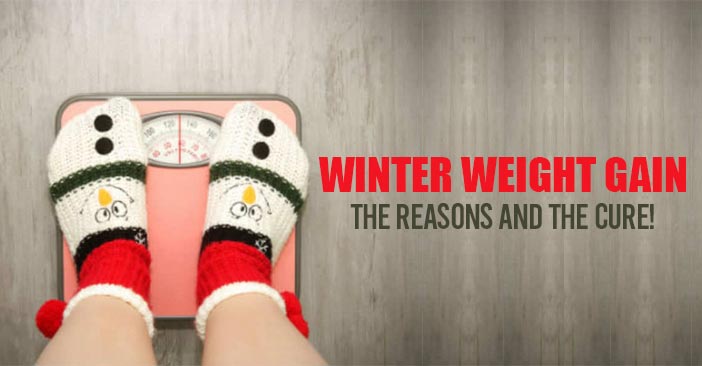Wellness
December 17 , 2019

Winter weight gain of a few pounds over the winter, happens quite often. It seems that every winter we acquire a few pounds, and come summer we don't lose them all again either. A few of them always stick around, adding to our weight every year. They can be quite hard to lose, those extra pounds!
Why does this happen and what can we do?
There are quite a few things involved. First, it seems likely that we have an inherited trait to store more fat as winter approaches. Several animals do this and it was probably necessary to survival for our antecedents. More layers of fat on the body protect us against the winter temperatures and then can be used as fuel in the late winter and early spring when food stocks would historically be very low. We likely have a tendency to eat more in the fall, when food is abundant after harvest time, to help this process along. We may also probably choose foods that are higher in fat content at this time.
Hormone levels can also affect our weight gain. The interaction of hormones and other chemicals in the brain can bring about changes in appetite and desires. Some neurotransmitters can also affect the way we eat. People who have difficulty losing weight often have low levels of these neurotransmitters and the consequences can include excessive appetite, depression and sleep disorders. At the same time, the lack of daylight caused by the shortening days during late fall and winter can bring on Seasonally Affected Disorder (S.A.D.) or winter depression.
Does Vitamin-D plays a role?
One of the fastest ways to give a lift to the energy levels and emotions is to eat foods that have a high carbohydrate level, including sugar treats, chips and cereals that give us a rapid blood sugar 'fix'. So people who feel down in the winter will tend to overeat or eat the wrong foods, leading to weight gain, more depression and a vicious cycle that is difficult to break.
Note: S.A.D. shouldn't be confused with clinical depression or bipolar.
So altogether there are plenty of reasons why we eat more high carbohydrate foods such as cookies, pies and chocolate in the winter, and to make matters worse, most of these foods also have high levels of fats. The best way to handle this is generally to substitute other foods that are also high in carbohydrate so that we get what our body craves, but which are fat free and have plenty of fiber. This means potatoes, wholegrain bread without butter, wholegrain rice, cereals, and fresh whole fruit.
It is also important to take more exercise. Often our physical activity levels reduce in the winter and we have a tendency to want to stay home and rest. This is common when it is cold outside. But we are not our ancestors! We have heating in our homes and can be sure that there will still be adequate food in the stores come February. We do not need to store fat the way that they did. Join a gym or get a stationary bicycle for the den. Transform those carbs into energy now instead of keeping them on the waistline until spring. Winter weight gain is easily avoidable this way.
Disclaimer:
The information on this blog is not a substitute for any professional medical diagnosis or treatment. The blog contains text, images or graphics are solely for informational purpose. Before implementing the information mentioned above, seek the advice of a professional doctor regarding any doubt or question you may have about the medical condition or treatment. Also, take the advice of a professional health care provider before making changes in your health care routine.




Our e-mail updates will keep you informed on our company, new products, stories from the millions of people we help live healthier longer lives.